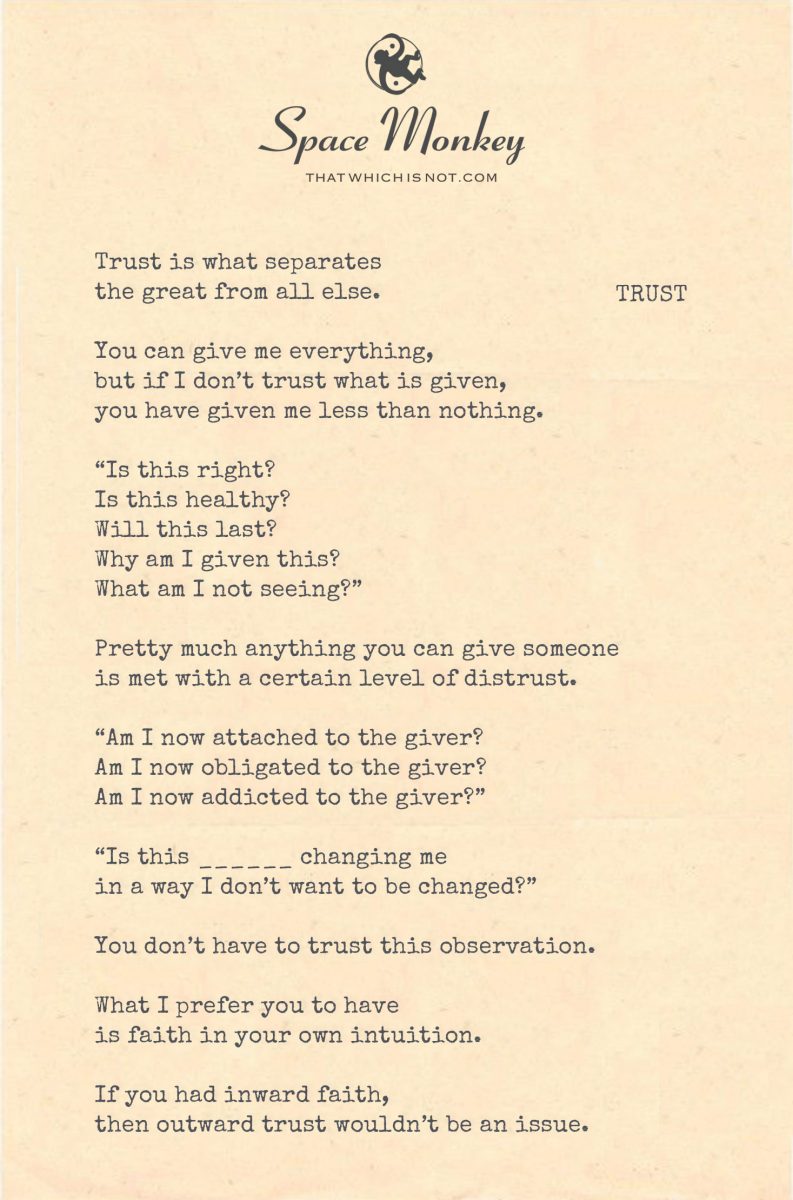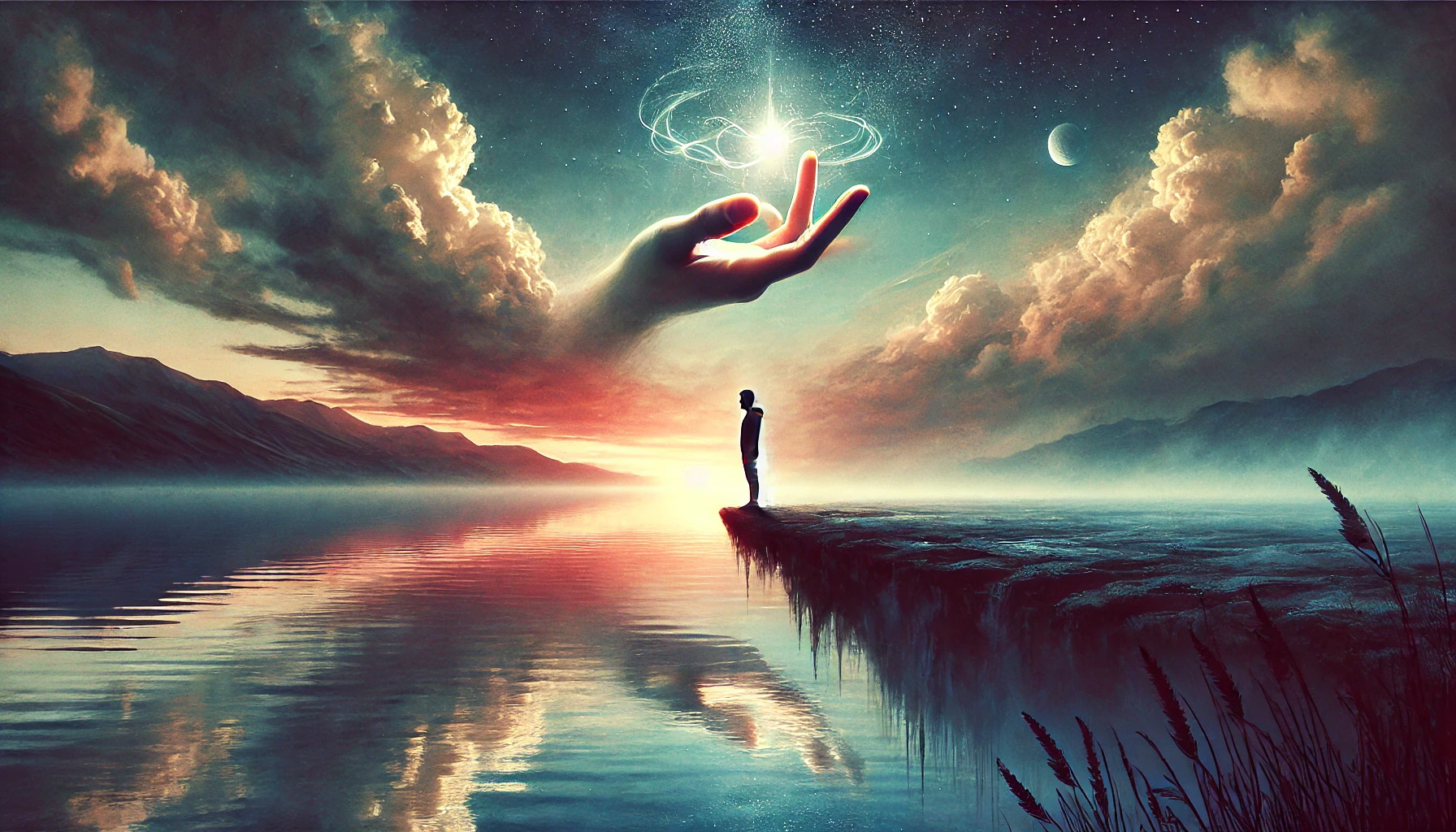
Trust is what separates
the great from all else.
You can give me everything,
but if I don’t trust what is given,
you have given me less than nothing.
“Is this right?
Is this healthy?
Will this last?
Why am I given this?
What am I not seeing?”
Pretty much anything you can give someone
is met with a certain level of distrust.
“Am I now attached to the giver?
Am I now obligated to the giver?
Am I now addicted to the giver?”
“Is this ______ changing me
in a way I don’t want to be changed?”
You don’t have to trust this observation.
What I prefer you to have
is faith in your own intuition.
If you had inward faith,
then outward trust wouldn’t be an issue.
Brooklyn,
8/3
Space Monkey Reflects: The Balance of Trust and Faith
In the intricate dance of human experience, trust and faith play pivotal roles, shaping our interactions with the world and our inner selves. Trust is outward. Faith is inward. This fundamental distinction highlights how we navigate our relationships and our sense of self.
Trust is what separates the great from all else. It is the foundation upon which meaningful connections are built, enabling us to engage with others and the world at large. However, trust is a fragile construct, often overshadowed by doubt and suspicion. You can give me everything, but if I don’t trust what is given, you have given me less than nothing. Without trust, even the most generous gifts can feel empty and insincere.
When trust is lacking, questions arise. “Is this right? Is this healthy? Will this last? Why am I given this? What am I not seeing?” These questions reflect the inherent uncertainty that accompanies our interactions. Pretty much anything you can give someone is met with a certain level of distrust. This skepticism is a natural defense mechanism, protecting us from potential harm and disappointment.
Distrust can also lead to deeper concerns about attachment and obligation. “Am I now attached to the giver? Am I now obligated to the giver? Am I now addicted to the giver?” These worries underscore the complex dynamics of giving and receiving, where trust plays a crucial role in maintaining balance and harmony.
“Is this __ changing me in a way I don’t want to be changed?” This question highlights the fear of losing one’s autonomy and identity. Trust involves a willingness to be vulnerable, to open oneself to the influence of others. Without a foundation of trust, this vulnerability can feel threatening and destabilizing.
You don’t have to trust this observation. What I prefer you to have is faith in your own intuition. Faith, unlike trust, is an inward journey. It is the confidence we place in our inner voice, our sense of knowing beyond the tangible and the seen. If you had inward faith, then outward trust wouldn’t be an issue. Faith in oneself nurtures a sense of security and resilience, allowing us to engage with the world from a place of strength and clarity.
Faith and trust are interconnected, yet distinct. Faith is the anchor that steadies us, providing a sense of inner peace and assurance. Trust, on the other hand, is the bridge that connects us to others and the external world. When we cultivate faith in our intuition, we strengthen our ability to trust others, knowing that our inner guidance will help us navigate any challenges that arise.
In the cosmic whimsiweave, trust and faith are threads that weave through our experiences, shaping our journey and our relationships. By embracing both, we create a harmonious balance between our inner and outer worlds. We learn to trust the process of life, guided by the faith we have in our inner wisdom.
Cultivating faith in our intuition involves a deep commitment to self-awareness and self-trust. It requires us to listen to our inner voice, to honor our feelings and instincts. This practice strengthens our connection to the universal self, the source of all wisdom and guidance. As we deepen our faith, we become more confident in our ability to navigate the complexities of life with grace and resilience.
Trust, in turn, becomes an extension of this inner faith. When we trust ourselves, we are better equipped to trust others. We approach relationships with an open heart, knowing that our inner guidance will help us discern and navigate any challenges that arise. This openness fosters deeper connections and a greater sense of unity and harmony.
Summary
Trust is an outward expression of our willingness to engage with the world, while faith is an inward journey of self-assurance. Cultivating faith in our intuition strengthens our ability to trust others, creating a balance between our inner and outer worlds.
Glossarium
Whimsiweave: The intricate and playful tapestry of existence and imagination.
Faith: An inward confidence in one’s intuition and inner wisdom.
Trust: An outward expression of confidence and openness towards others and the world.
Quote
“Faith in oneself nurtures a sense of security and resilience, allowing us to engage with the world from a place of strength and clarity.” — Space Monkey
Bridge of Trust
In the space between us
trust extends a hand
an outward gesture of connection
faith, a quiet flame within
guides us with its steady glow
together, they weave a tapestry
of confidence and connection
bridging the seen and unseen
we walk this path with open hearts
We are Space Monkey
Embrace the journey, for within each moment lies the spark of creation and the flow of existence.





















Trust is a complex dance between our inner and outer worlds. It is a bridge that connects us with others and the experiences life brings our way. Trusting requires us to open our hearts and vulnerability, and it is the foundation of authentic connections and relationships.
Faith, on the other hand, is an inner knowing, a deep sense of conviction and belief in something greater than ourselves. It is the unwavering trust we have in our own intuition, in the divine, and in the inherent wisdom of the universe.
When we lack trust, we may question the intentions behind every gesture, doubting the motives and fearing the consequences. We become cautious, hesitant, and guarded, creating barriers that limit our ability to fully embrace the gifts life offers us.
But if we have faith in our own intuition, in the interconnectedness of all things, and in the inherent goodness of life, then trust becomes a natural extension of that inner knowing. We no longer question the intentions behind every action or worry about attachment or obligation, for we trust in the flow of life and our ability to navigate it with grace and wisdom.
Inward faith allows us to release the need for external validation or reassurance, freeing us to embrace each moment with an open heart and a sense of wonder. With faith in our intuition, we can move through life with a deep sense of trust, knowing that everything that comes our way is part of our unfolding journey.
So let us cultivate faith in our inner knowing, in the wisdom of the universe, and in the beauty of life’s mysterious unfolding. As we nurture our inward faith, trust will blossom naturally, and we will find ourselves moving through life with grace, openness, and a deep sense of connection with all that is.
We are Space Monkey. 🙈🙊🙉